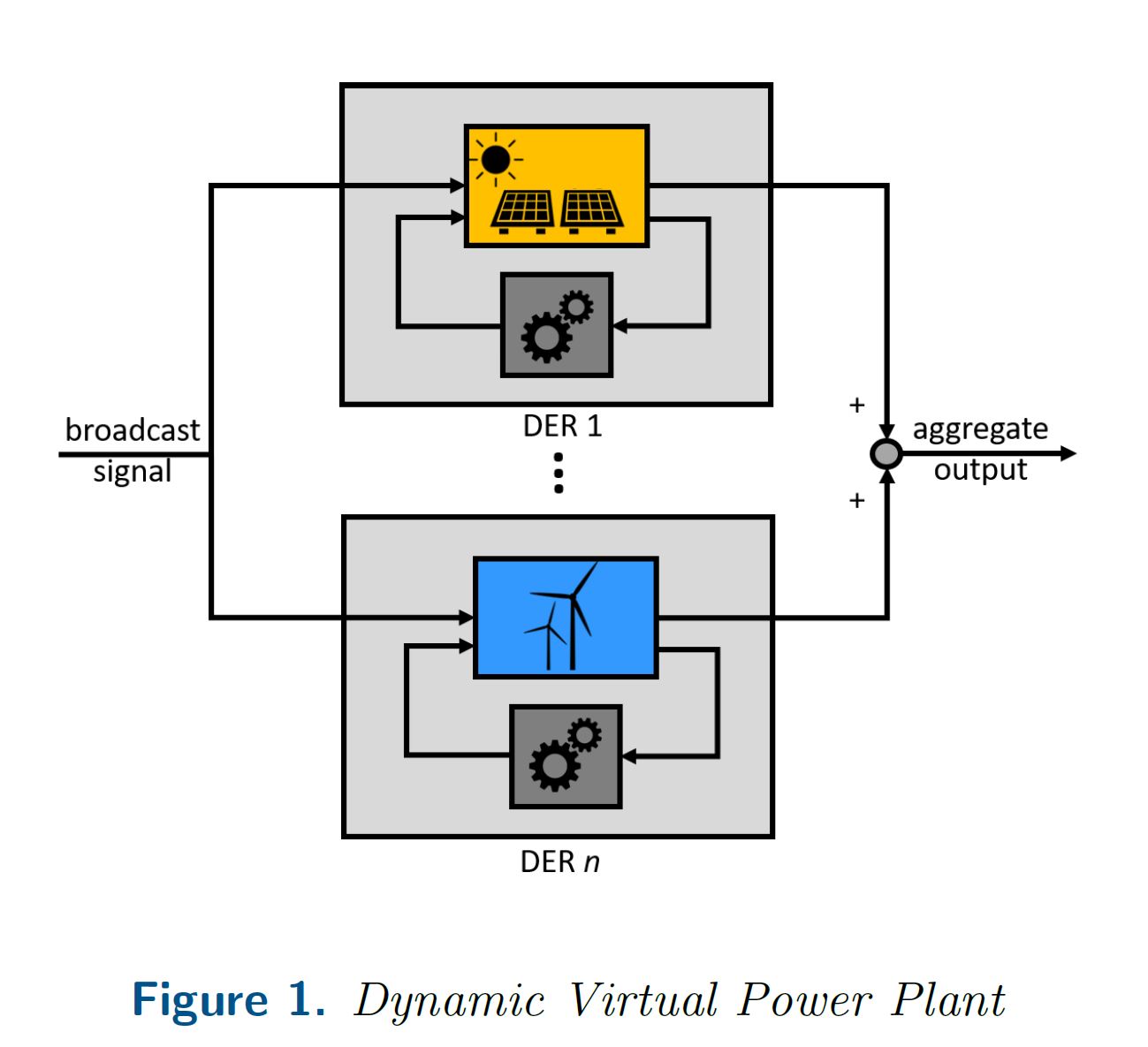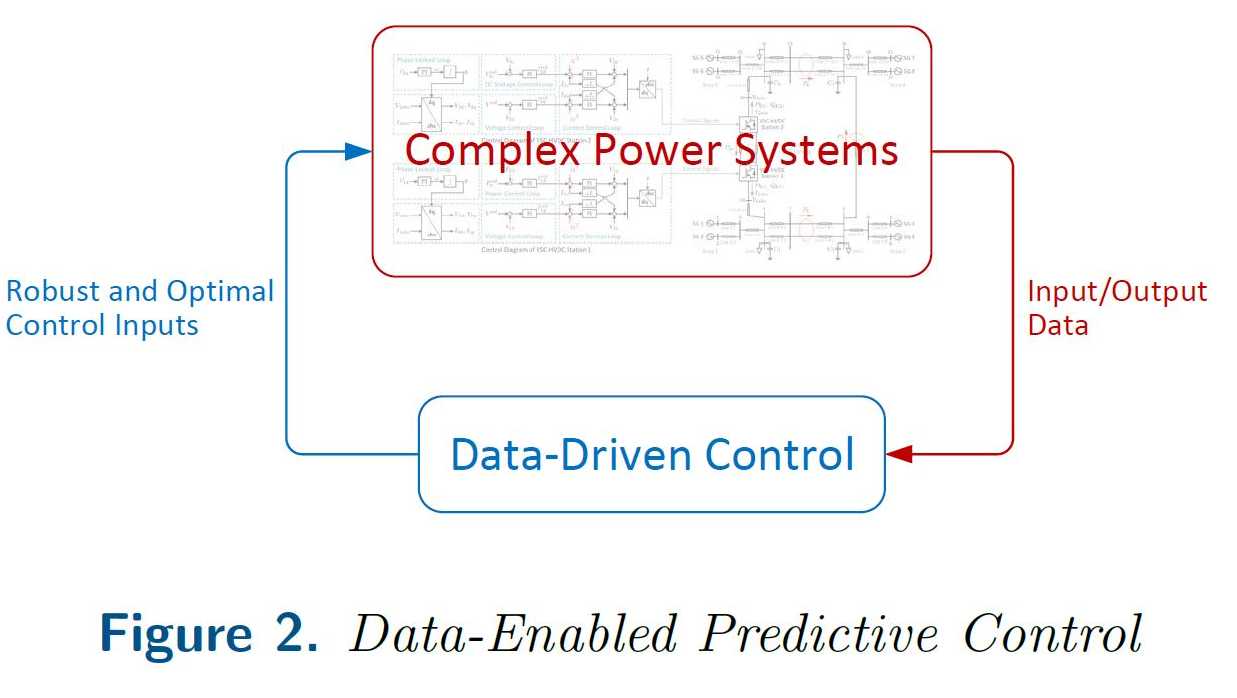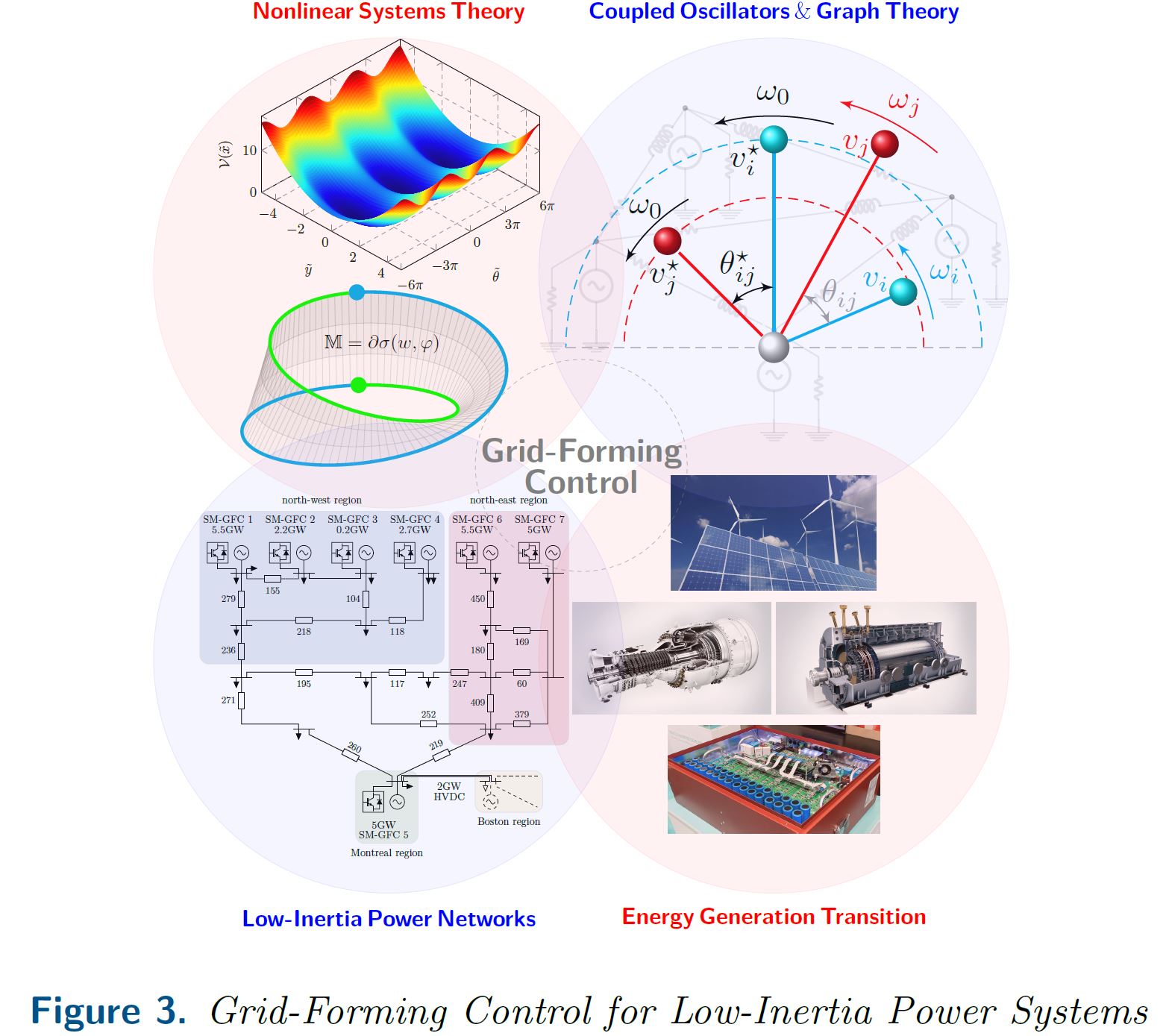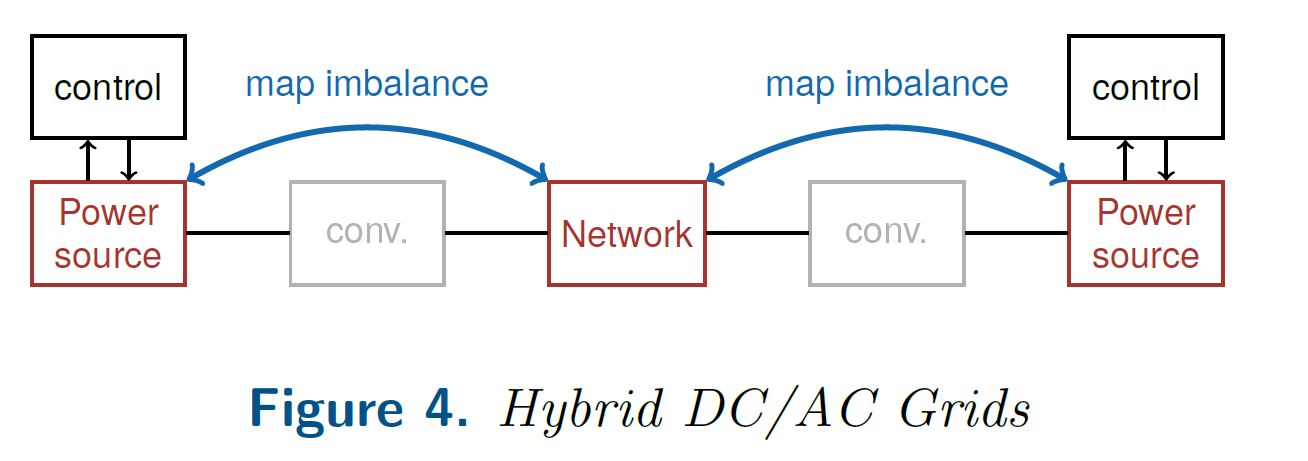Power System Control
Increasing penetration of renewable generation such as wind and solar in the power grid is creating new challenges for power system stability and control. As renewable generation is interfaced to the grid via power converters, traditional control paradigms employed by fossil fuel-red generation will have to be replaced by novel power converter control techniques. Our work aims to reimagine power converter control to ensure stability of future power systems, with a particular focus on (1) ensemble control of distributed energy resources to act collectively as a single dynamic virtual power plant, (2) data-enabled predictive control of power converters, (3) grid forming converter control for low-inertia power systems, and (4) control for hybrid DC/AC grids.
Research
Power converter control design is an interdisciplinary problem that lies at the intersection of control theory, power systems, and power electronics. In this work, inspired by ideas from nonlinear systems, algebraic graph theory, and distributed, optimal, and data-driven control, we synthesize new control strategies that ensure robust operation of futuristic power system under massive integration of renewable energy sources. The replacement of fossil fuel-fired synchronous machines with converter-interfaced renewable generation causes a dramatic reduction in the inertia of the power system, decreasing its natural resistance to disturbances. Another consequence of renewable generation such as wind and solar is increased uncertainty and variability, resulting in more frequent disturbances. In addition, the structure of the power system is changing as it moves from a small number of centralized power plants to a large number of distributed energy resources. Furthermore, the deployment of new sensor and actuation technologies is leading to increased digitization and automation, transforming traditional power systems into smart grids. These changes create new challenges and opportunities for control design of future power systems. Our work focuses in particular on the following areas.
Dynamic Virtual Power Plant (DVPP)
Future power systems will have to supply fast ancillary services, such as frequency control and voltage regulation, using distributed energy resources (DERs) in place of today's centralized power plants. Therefore, it is important to design distributed controllers for this network of DERs so that they can act collectively to provide these desired ancillary services. This project proposes to group a collection of heterogeneous DERs into a single virtual power plant, with the goal that in aggregate they will match a desired dynamic behavior, as shown in Figure 1. This is a novel problem formulation both for power systems and in the control community, where we refer to it as ensemble control of heterogeneous devices. The challenge is to match the desired aggregate behavior subject to the individual constraints of each device (ie. limits on energy, power, response time, etc). Two approaches have been developed: (i) a decentralized control design based on a divide-and-conquer strategy using dynamic participation factors, and (ii) a centralized control design which uses a modified version of the recently developed system level synthesis control technique and explicitly incorporates state and input constraints.

Data-Enabled Predicitve Control (DeePC)
The integration of power-electronic devices dramatically increases the order of the system, and the system becomes so complicated that its model cannot be obtained anymore in practice. Furthermore, the model also becomes time-varying since the dispatch will be much more variable with renewables. Hence, we research on data-driven control which aims at performing optimal control only by collecting input/output data from the system, as shown in Figure 2. Conventional control schemes for power converters are model-based, however, an accurate system model can rarely be obtained especially when the converter is connected to a power grid, which could result in inferior performance or even instabilities. To tackle such challenges, we employ a novel data-enabled predictive control (DeePC) algorithm in grid-connected power converters to perform safe and optimal control. Rather than a model, the DeePC algorithm solely needs input/output data measured from the unknown system to predict future trajectories. We show that the DeePC algorithm significantly improves the performance of the converter and also helps in damping power system oscillations.

Grid-Forming Control for Low-Inertia Power Systems
This project focuses on grid-forming converter modelling, control design, and implementation to address challenges regarding large-scale utilization of converters in low-inertia power system, as shown in Figure 3. We have recently proposed a new grid-forming control for power converters, termed hybrid angle control that ensures the almost global closed-loop stability. Hybrid angle control combines the recently proposed matching control with a novel nonlinear angle feedback reminiscent of (though not identical to) classic droop and dispatchable virtual oscillator controls. The synthesis of hybrid angle control is inspired by the complementary benefits of the dc-based matching and ac-based grid-forming controls. Furthermore, we explore the device and system-level performance of the proposed control techniques via simulation tests as well as in hardware-in-the-loop and laboratory experiments.

Hybrid DC/AC Grids
Today, renewable energy sources and high voltage DC (HVDC) transmission lines do not contribute to stabilizing power systems. This results in larger, and more frequent, frequency deviations and ultimately jeopardizes the stability of today's power system. A key question is therefore, how to control the renewable generation, energy storage, DC/AC power converters, and HVDC transmission lines to ensure stability and resilient operation of tomorrow's sustainable power system. The main goal of this project is to develop control strategies for the DC/AC power conversion elements that make power or energy imbalances transparent and to develop control strategies for the power sources that respond to power or energy imbalances to support the grid. This principle is illustrated in Figure 4 and can be understood by considering the operation of synchronous machines in today’s system.

People
Professor, Head of Automatic Control Laboratory
- Florian Dörfler
Postdoc
- Michael Fisher
- Linbin Huang
PhD-candidate
- Verena Häberle
- Jeremy Coulson
- external page Ali Tayyebi
- Irina Subotic
Outreach
external page Gerät das Stromnetz aus dem Gleichgewicht? - Republik, 12.02.2021 (in German)
Publications
[1] Huang, L., Coulson, J., Lygeros, J. and Dörfler, F., 2019, December. Data-enabled predictive control for grid-connected power converters. In 2019 IEEE 58th Conference on Decision and Control (CDC) (pp. 8130-8135). IEEE.
[2] Huang, L., Coulson, J., Lygeros, J. and Dörfler, F., 2019. Decentralized Data-Enabled Predictive Control for Power System Oscillation Damping. arXiv preprint arXiv:1911.12151.
[3] A. Tayyebi, A. Anta, and F. Dörfler, Hybrid angle control and almost global stability of grid- forming power converters, 2020, IEEE Transactions on Automatic Control, Submitted, preprint available at https://arxiv.org/abs/2008.07661.
[4] A. Tayyebi, A. Anta, and F. Dörfler, Almost globally stable grid-forming hybrid angle control, in IEEE Conference on Decision and Control (CDC), 2020, to appear.
[5] A. Tayyebi, D. Gross, A. Anta, F. Kupzog, and F. Dörfler, Frequency stability of synchronous machines and grid-forming power converters, IEEE J. Emerg. Sel. Topics Power Electron., 2020.
[6] A. Crivellaro, A. Tayyebi, C. Gavriluta, D. Gross, A. Anta, F. Kupzog, and F. Dörfler, Beyond low-inertia systems: Massive integration of grid-forming power converters in transmission grids, in IEEE PES General Meeting, 2020, To appear, preprint available at https://arxiv.org/abs/1911.02870.